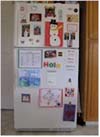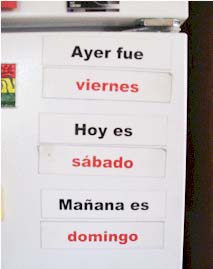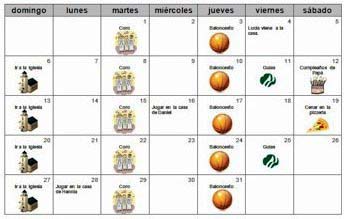7 ways to use your refrigerator door to build vocabulary
By Janet Castrejon

This website contains affiliate links. If you make a purchase through these links, we earn a small commission. As an Amazon Associate I earn from qualifying purchases.
In most households with children, the refrigerator door is full of children's drawings and artwork. Since the refrigerator is a frequently visited place in most households, it serves as a great teaching center as well as a place to display your child's artwork. Below I describe 7 ways to use your refrigerator door to build your child's foreign language vocabulary.

1. Today is . . .
Homemade refrigerator magnetics with the day of the week can help children learn the names of the days in the foreign language. Most office supply stores (Office Depot, OfficeMax, Staples, etc.) sell magnetic sheets that you print on using your inkjet printer. In a word processing program, type in a large font "Today is" in the foreign language. Then type in the days of the week, each on a separate line. You could also include "Yesterday was" and Tomorrow is" as I do on my refrigerator (see photo to the right). Each day the children select the correct day of the week to put on the refrigerator.
2. Calendar
A refrigerator calendar can help build foreign language vocabulary as well as let children know what's going on in their lives. I download free calendars from Calendars that Work and then change the text to Spanish. I put clipart or photos plus words to let them know what activities they have each day. Each morning the children cross off the previous day. This also helps them know what day of the week it is so that they can change the refrigerator magnet described above.

3. Daily Activities
Another alternative to having a calendar on the refrigerator is to have a whiteboard with the day's activities. On the whiteboard you list the day's activities in the foreign language.
4. Magnetic Poetry
Magnetic poetry kits are available in many languages on Amazon.com (Search for "magnetic poetry kit" and the language that you are looking for). The kits include words on small magnets which can be put together to form sentences or poetry. You put all of the words on the refrigerator so that the kids can use them to assemble sentences or poems to express themselves. You could also create poetry kits yourself using the magnetic sheets described above.
5. Foods
A great way to teach kids about nutrition as well as teach food vocabulary in the foreign language is to have them keep track of everything that they eat in a day. I can't imagine that you could keep it up long term, but you could try it for a week to start. Even if you do it only a week, children will become familiar with the names of the foods that they commonly eat.
On a whiteboard or a piece of paper on the refrigerator, write the category headings "Fruits," "Vegetables," "Grains," "Dairy," and "Meat, nuts, and beans" in the foreign language. At breakfast, have them decide which category each of their foods go in. Have them write them in the foreign language under the category heading on the white board or paper. When children return from school, they can record what they ate while out of the house. Have a contest to see who ate the healthiest each day!
6. Word of the Day
Post a new foreign language vocabulary word on the refrigerator each day. The Word of the Day is described in detail in How to build your child's vocabulary using "The Word of the Day".
7. Letter magnets
Magnetic letters are nothing new to refrigerator doors, but I felt that I needed to mention them too. Magnetic letters are great for letting children practice with spelling words in the foreign language. You can say a word while you are busy cooking, and they can spell it using the magnetic letters.
The letters are also great for small children who are learning their letters. You can give them one letter and ask them to find another that looks like it. For example, "Here's an R. Can you find another letter R on the refrigerator?"
Related Articles
How to make your own vocabulary games
Board games that build foreign language vocabulary and grammar skills


